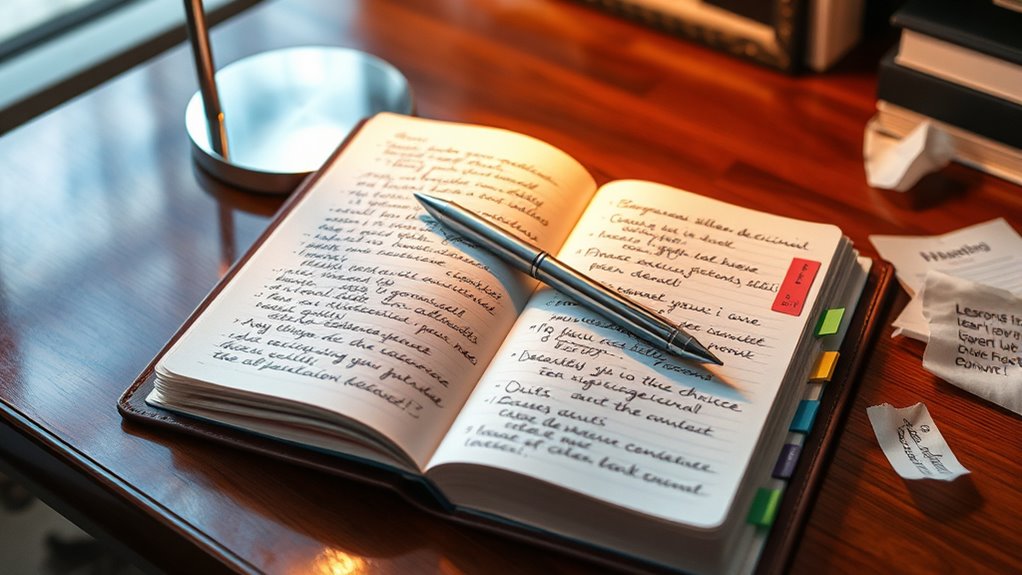Using decision journals helps you objectively track every choice you make, whether they lead to success or setbacks. By recording your reasoning, you gain clarity, identify patterns, and learn from mistakes. This process boosts accountability and fosters honest reflection, so you make smarter decisions over time. Incorporating consistent journaling can transform how you approach challenges, building confidence and discipline. Stay tuned for more tips on how to maximize your decision-making mastery through effective journaling techniques.
Key Takeaways
- Decision journals enable systematic reflection on both successful and flawed choices, fostering learning and growth.
- Recording reasoning and outcomes creates a clear trail to identify patterns and recurring mistakes.
- Regular review of journal entries enhances self-awareness and helps refine decision-making strategies.
- Documenting decisions promotes accountability, encouraging honest evaluation of what worked and what didn’t.
- Incorporating insights from decision journals supports continuous improvement and smarter future choices.

Have you ever wondered how some people make better decisions than others? The secret often lies in their ability to maintain mental clarity and hold themselves accountable. When you’re clear-headed, you’re better equipped to evaluate options objectively, avoiding the emotional biases and impulsive reactions that cloud judgment. Decision journals can be a powerful tool to sharpen this mental clarity and embed accountability practices into your decision-making process. By systematically recording your choices and the reasoning behind them, you create a trail for reflection that illuminates your thought patterns and highlights areas for improvement.
Using a decision journal encourages you to pause before acting, forcing you to articulate your goals, assumptions, and anticipated outcomes. This habit helps you stay focused on your long-term objectives rather than getting sidetracked by short-term temptations. As you document each decision, you’re practicing a form of mental discipline that enhances your clarity, making it easier to identify when your emotions or biases influence your judgment. Over time, this clarity allows you to spot recurring mistakes and develop better strategies for future decisions.
Pausing to clarify goals and assumptions sharpens focus and improves future decision strategies.
Accountability practices are woven into decision journals because they hold you responsible for your choices. When you write down why you made a decision and what you expected, you create a reference point. Later, you can compare your initial reasoning with the actual results, providing honest feedback about what worked and what didn’t. This process cultivates a growth mindset, where mistakes become valuable lessons rather than failures. It also fosters honesty with yourself, reinforcing the habit of owning your decisions, whether they lead to success or setbacks.
The act of reviewing your journal entries regularly helps solidify valuable insights, enabling you to learn from your experiences. You begin to notice patterns—perhaps you tend to rush decisions under stress or overlook important data. Recognizing these tendencies allows you to implement targeted accountability practices, such as setting reminders to slow down or seeking additional input before finalizing choices. Over time, this continuous feedback loop sharpens your decision-making skills, making each choice more deliberate and informed.
In essence, a decision journal is more than just a log; it’s a tool for cultivating mental clarity and strengthening accountability. It transforms decision-making from a reactive process into a mindful discipline. By consistently writing down your choices and reflecting on them, you develop a clearer understanding of your thinking, which leads to smarter, more consistent decisions. This habit ultimately empowers you to navigate complex situations with confidence, knowing you’ve built a system that supports better judgment and continuous growth. Incorporating practices such as hydration and maintaining mental health can further enhance your decision-making capacity.
Frequently Asked Questions
How Can Decision Journals Improve Long-Term Thinking?
Thinking about how decision journals enhance long-term thinking, you realize they help you with future planning and risk assessment. By documenting your decisions, you identify patterns, learn from mistakes, and refine your approach. This process encourages you to contemplate long-term consequences rather than immediate gains. As a result, you become more strategic, making better-informed choices that support sustained growth and success over time.
What Are Common Mistakes When Starting a Decision Journal?
Starting a decision journal can feel like steering a maze blindfolded. You might overlook common mistakes like ignoring bias awareness or emotional tracking, which cloud your judgment. You could also record decisions inconsistently or judge past choices harshly. These pitfalls hinder learning. To avoid them, stay mindful of your biases and emotions, consistently document your decisions, and review with an open mind—your map through the maze.
How Often Should I Review My Decision Journal Entries?
You should review your decision journal entries regularly to maintain journaling consistency and improve your decision-making skills. A good frequency assessment suggests checking in weekly or bi-weekly, depending on how many decisions you make. Consistent reviews help you identify patterns, learn from mistakes, and reinforce good habits. If you notice your entries becoming less frequent, adjust your schedule to stay accountable and maximize the benefits of your decision journal.
Can Decision Journals Help in Group Decision-Making Processes?
You might wonder if decision journals can improve group decision-making. They can boost team collaboration by providing a clear record of each member’s input and reasoning. This transparency fosters collective accountability, ensuring everyone stays aligned and learns from past choices. By reviewing journal entries together, your team can identify patterns, improve future decisions, and build a stronger, more cohesive decision-making process.
What Tools or Apps Are Best for Maintaining a Decision Journal?
Like Sherlock Holmes with his trusty notebook, you can use digital tools or journaling apps to track your decisions effortlessly. Top options include Notion, Evernote, and Day One, which organize your thoughts and reflections seamlessly. These journaling apps help you analyze your choices over time, improving your decision-making skills. By choosing the right digital tools, you turn everyday decisions into valuable lessons, just like a detective solving mysteries.
Conclusion
By keeping a decision journal, you turn your choices into a guiding compass, illuminating your path through the fog of uncertainty. Each entry becomes a mirror reflecting your habits and biases, helping you learn from both your triumphs and mistakes. Think of it as planting seeds for better judgment—watering them with honesty and reflection. Embrace this practice, and watch your decision-making skills grow stronger, transforming your future into a landscape of wiser, more confident choices.









